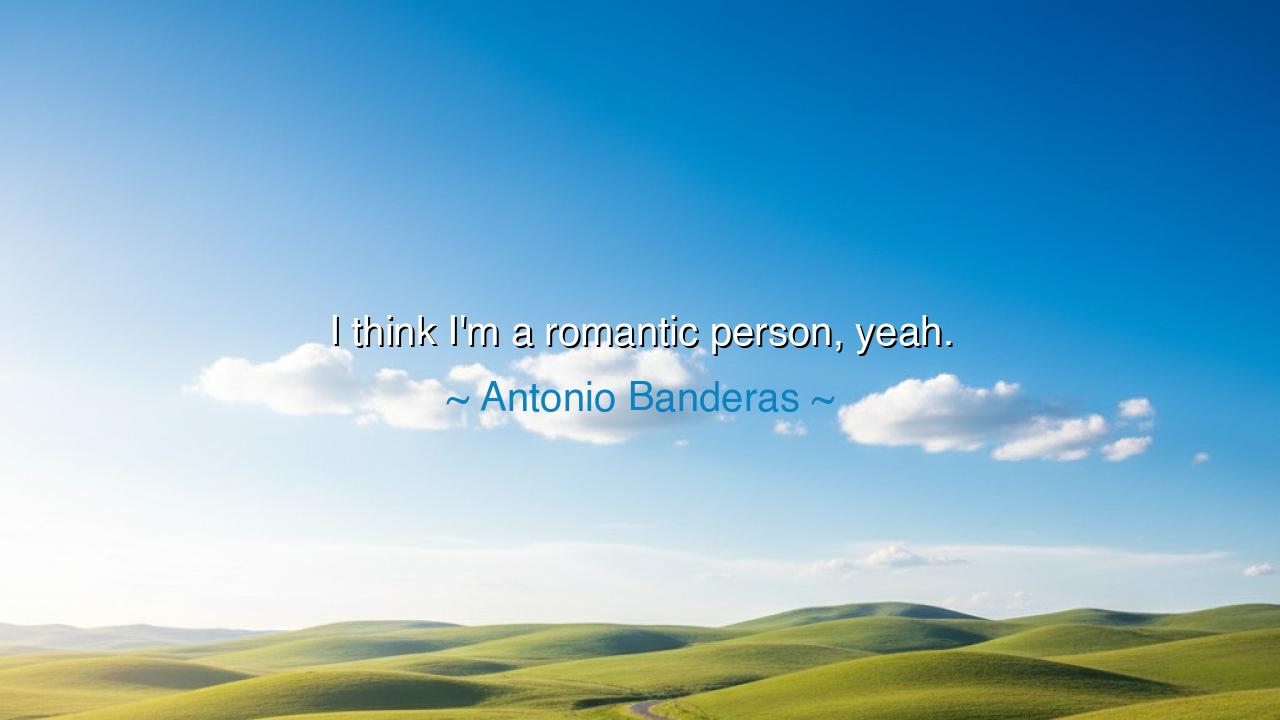
I think I'm a romantic person, yeah.






In the words of Antonio Banderas, “I think I’m a romantic person, yeah.” Though spoken with humility, these words reveal a truth as old as human longing: to be romantic is not merely to cherish candlelight or whisper soft words, but to live with the heart open to beauty, wonder, and love. In confessing this, Banderas does not claim perfection; rather, he acknowledges a spirit inclined toward passion, tenderness, and devotion—the very qualities that lift life above the ordinary.
The ancients honored such souls. In the poetry of Sappho, in the songs of the troubadours, and in the ballads sung across medieval courts, the romantic spirit was praised as a noble fire, an energy that transformed even mundane existence into something radiant. To be romantic was to dare to hope, even in a world filled with sorrow. It was to believe that love could redeem, that beauty could heal, and that life, when lived with passion, could mirror the divine. Banderas’s words echo this ancient heritage, placing him in a lineage of men and women who confessed that their lives were guided not by cold reason alone, but by the warmth of the heart.
To understand this truth more fully, we may look to the story of Dante Alighieri and his muse, Beatrice. Though their encounters were brief, Dante carried her memory throughout his life, and it was her image that inspired The Divine Comedy, one of the greatest works of literature. Was this practical? Was it logical? No. But it was profoundly romantic, and through that devotion Dante transformed private longing into universal truth. Like Dante, the romantic person is one who allows love to inspire creation, courage, and transformation.
In many ways, Banderas himself has embodied this spirit in his art. His roles, often filled with passion and intensity, reflect a man who embraces life with fire, whether through drama, comedy, or action. To admit, “I think I’m a romantic person,” is not only a statement about his personal affections but a glimpse into the energy he brings to his work. For the romantic heart cannot separate life from art—it pours the same devotion into both, and in so doing, awakens the hearts of others.
Yet the path of the romantic is not without cost. To feel deeply is also to suffer deeply. The one who opens the heart to love also opens it to loss, rejection, and grief. But here lies the paradox: it is better to live with wounds of passion than with the emptiness of apathy. For wounds may heal and scars may strengthen, but a heart that never dares to love remains barren. The romantic knows this truth, and thus embraces risk as the price of beauty.
The lesson for us, then, is clear: do not be ashamed to be called romantic. In a world that prizes cynicism and calculation, to live with openness, tenderness, and passion is an act of courage. To love without restraint, to speak words of admiration, to cherish beauty in all its forms—these are not weaknesses, but the signs of a noble spirit. The ancients believed that eros, the power of love, could move even the gods; so too can it move us to greater compassion, greater creativity, and greater humanity.
And what must you do? Begin by allowing your own romantic spirit to awaken. Write a letter to one you cherish, not with polished formality but with sincerity. Notice beauty in the world around you—a flower, a sunset, a melody—and honor it with gratitude. Dare to risk affection, even when the world tells you to be guarded. Live, as Banderas reminds us, as one who can honestly say, “I think I’m a romantic person, yeah.” For in that confession lies not only personal truth but universal wisdom: that the heart, when kept alive with romance, becomes the brightest light in a world often darkened by indifference.






AAdministratorAdministrator
Welcome, honored guests. Please leave a comment, we will respond soon